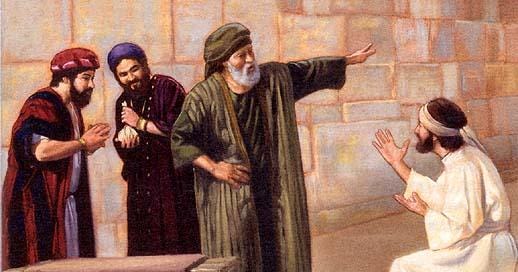Today's readings involve false accusations. How do we know who to trust? That's why Jesus gave us the Church and Tradition, to ensure that we truly grasp the word that is more precious than gold, rather than trusting false preachers, like in our first reading.
Reading 1
Am 7:10-17
Amaziah, the priest of Bethel, sent word to Jeroboam, king of Israel: "Amos has conspired against you here within Israel; the country cannot endure all his words. For this is what Amos says: Jeroboam shall die by the sword, and Israel shall surely be exiled from its land."
To Amos, Amaziah said: "Off with you, visionary, flee to the land of Judah! There earn your bread by prophesying, but never again prophesy in Bethel; for it is the king's sanctuary and a royal temple."
Amos answered Amaziah, "I was no prophet, nor have I belonged to a company of prophets; I was a shepherd and a dresser of sycamores. The LORD took me from following the flock, and said to me, 'Go, prophesy to my people Israel.' Now hear the word of the LORD!"
You say: prophesy not against Israel, preach not against the house of Isaac. Now thus says the LORD: Your wife shall be made a harlot in the city, and your sons and daughters shall fall by the sword; Your land shall be divided by measuring line, and you yourself shall die in an unclean land; Israel shall be exiled far from its land.
Amaziah is trying to slander Amos here. "Earn your bread by prophesying" is an accusation that Amos is in it for the money.
Except, Amos doesn't earn any money as a prophet; he's a shepherd. In fact, Amos rejects the title "prophet" altogether. He's just doing what God asks him to do, as we all should. He doesn't need to claim a fancy title for that.
Amos doubles down on his prophecy, though. Not only is Israel going to be conquered, he tells Amaziah what's going to happen to him specifically for his sins.
Responsorial Psalm
Ps 19:8, 9, 10, 11
R. (10cd) The judgments of the Lord are true, and all of them are just.
The law of the LORD is perfect,
refreshing the soul;
The decree of the LORD is trustworthy,
giving wisdom to the simple.
R. The judgments of the Lord are true, and all of them are just.
The precepts of the LORD are right,
rejoicing the heart;
The command of the LORD is clear,
enlightening the eye.
R. The judgments of the Lord are true, and all of them are just.
The fear of the LORD is pure,
enduring forever;
The ordinances of the LORD are true,
all of them just.
R. The judgments of the Lord are true, and all of them are just.
They are more precious than gold,
than a heap of purest gold;
Sweeter also than syrup
or honey from the comb.
R. The judgments of the Lord are true, and all of them are just.
In the first reading, Amaziah's accusations aren't even accurate. He claims that Amos prophesied that Jeroboam "shall die by the word," but that's not what Amos said. Amos said the house of Jeroboam would die that way.
Which is completely accurate, as Jeroboam's successor Zacharias is killed.1
So when this psalm tells us that the Word of God is perfect, trustworthy, and pure, we must be cautious who we're actually listening to. Do we heed the word of the Lord, or what someone else tells us about the word of the Lord?2
Alleluia
2 Cor 5:19
R. Alleluia, alleluia.
God was reconciling the world to himself in Christ
and entrusting to us the message of reconciliation.
R. Alleluia, alleluia.
Jesus forgives sins, but he’s also allowed us to participate in salvation by spreading his message to the world.
Gospel
Mt 9:1-8
After entering a boat, Jesus made the crossing, and came into his own town. And there people brought to him a paralytic lying on a stretcher. When Jesus saw their faith, he said to the paralytic, "Courage, child, your sins are forgiven."
At that, some of the scribes said to themselves, "This man is blaspheming."
Jesus knew what they were thinking, and said, "Why do you harbor evil thoughts? Which is easier, to say, 'Your sins are forgiven,' or to say, 'Rise and walk'? But that you may know that the Son of Man has authority on earth to forgive sins"– he then said to the paralytic, "Rise, pick up your stretcher, and go home."
He rose and went home. When the crowds saw this they were struck with awe and glorified God who had given such authority to men.
Matthew was one of the later Gospels,3 being aware of both Mark and Luke. So by the time Matthew was writing, the theology of reconciliation had developed a little.
That’s why the last line is slightly different than Mark’s4 version: Now some of the scribes were sitting there asking themselves, “Why does this man speak that way?* He is blaspheming. Who but God alone can forgive sins?”
Jesus conferred the power of forgiveness to the Apostles and their successors, which Matthew was aware of.
Still, the point of the story remains: forgiveness of sins and reconciling with God is the most important miracle occurring here. Just as the psalmist requested, Jesus demonstrates his power to the unbeliever in a visible way—allowing the man to walk.
That’s not going to happen for every paralytic. But if we go to confession, our sins will be forgiven every time.
I realize the irony of me saying this here. Please trust the Holy Spirit's guidance over mine.
It may or may not have been written after John.



